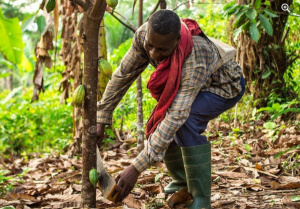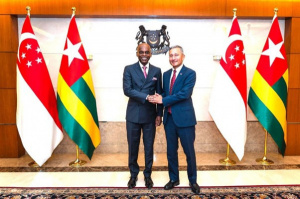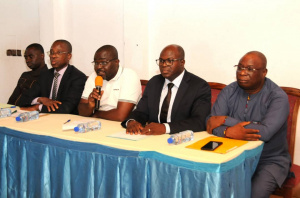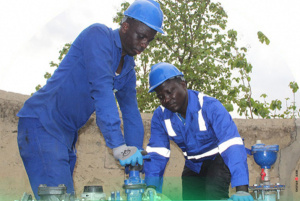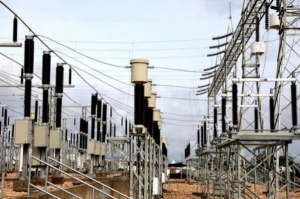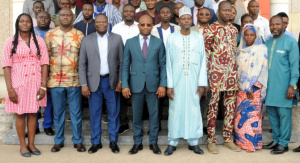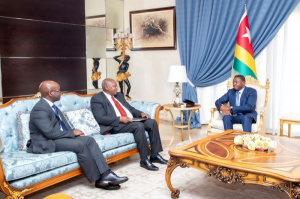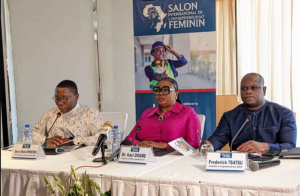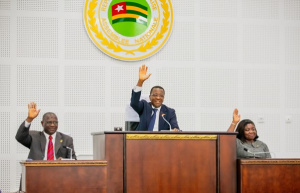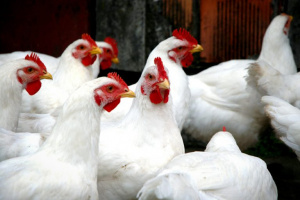Togo First
Togo: Economic Activity Expanded by 6.3% in Q3 2024, YoY
Togo's gross domestic product (GDP) grew by 6.3% in the third quarter of 2024 compared to the same period in 2023. According to the National Institute of Statistics, INSEED, which reported the data, the surge is weaker than the two previous quarters. In Q1 and Q2 2024, Togo’s GDP was up by 14.5% and 12.5% year-on-year, respectively.
According to the INSEED, Q3’s growth was mainly driven by the primary and secondary sectors. They expanded by 10.7% and 21.1%, respectively.
Agricultural Sector
In the primary sector, agriculture, livestock, hunting, and forestry grew by 10.4%, accounting for 98% of the sector's value added. However, fishing declined sharply by 29% due to scarce fish stocks.
Extractive Industries Boom
The secondary sector experienced significant growth in mining and quarrying (+209.5%), food processing (+36.7%), beverages (+21.9%), building materials (+27.8%), and metal products (+30.1%). Construction, however, continued to decline by 16.8%.
Timid Service Sector
The tertiary sector, which accounts for over half of Togo's economy, posted modest growth of 0.8%. While trade, financial services, and leisure activities performed well, declines in public services, including education (-13%) and administration (-24.4%), offset these gains.
By 2024, Togo's GDP was estimated at CFA5,900 billion ($9.8 billion), according to the World Bank.
This article was initially published in French by Ayi Renaud Dossavi
Edited in English by Ola Schad Akinocho
Industry-Investment: Togo Seals New Deal with Singapore, Further Boosting Partnership
Togo and Singapore signed a Memorandum of Understanding (MOU) on March 23, 2025, to enhance bilateral cooperation. The agreement was signed by Togolese and Singaporean Foreign Ministers, Robert Dussey and Vivian Balakrishnan, respectively. Besides bolstering ties between both sides, the deal should foster investment and industrial development in Togo.
Singapore and Togo have been diplomatic partners for several years. The recent deal aligns with previous commitments, including visa exemptions and diplomatic consultation protocols.
On the investment front, the two countries have been collaborating since 2010 through an economic and technical partnership agreement. This enabled many Singaporean firms, such as Olam, Wafo, GUUD, Strafor, and PIL, to come to Togo. The new deal consolidates existing cooperation and paves the way for new economic and industrial opportunities.
This article was initially published in French by Esaïe Edoh
Edited in English by Ola Schad Akinocho
Togo Launches Tractor Training to Boost Agricultural Mechanization
The National Employment Agency of Togo (ANPE) launched a vocational training course in driving and repairing agricultural tractors on March 20, 2025. Participants-100 in total-come from all five Togolese regions.
For this program, the ANPE collaborates with the Ministry of Agriculture and Rural Development and the Institut National de Formation Agricole (INFA) in Tové. The enrolled students, divided into two groups, will be trained for two to three months in Kara and Tové. Organizers seek to have them operational by the 2025 agricultural season.
"The aim is to meet a critical need in the agricultural production chain: the lack of mechanization skills," stresses ANPE Managing Director Kossi Tsiglo.
At the INFA in Tové, learners acquire practical skills in operating, maintaining, and repairing tractors and power tillers, according to Dr. Métang Bamazé, Director of the Institute.
Togo: Water Utility Conducts Maintenance to Ensure Water Supply Reliability
The Togolese water utility, Togolaise des Eaux (TdE), maintained its Cacaveli treatment plant in Lomé this morning. The works aimed to ensure the reliability of production equipment and prevent major breakdowns.
Disruptions to the water supply are expected in certain districts of the capital. However, TdE assures that measures are in place to restore service quickly.
The water utility has recently been ramping up efforts to modernize its infrastructure amid rising demand. In 2022, the national drinking water coverage rate stood at 67%, with a high of 71% in Greater Lomé.
This article was initially published in French by Ayi Renaud Dossavi
Edited in English by Ola Schad Akinocho
Togo: Electrification Rate at 70% in 2024, Up 2% YoY
Togo recorded a 70% electrification rate in 2024, meeting the government’s target. According to the Ministry of Mines and Energy, which reported the figure, it is 2% higher than in 2023 and 20% more than in 2020.
Driven by several projects, the surge aligns with the government’s ambition for universal coverage by 2030. These projects include off-grid solar programs like the CIZO Programme, which aims to electrify 317 rural communities. There were also the PRAVOST, which is the CIZO’s social component, extension works at the Blitta solar plant, and other projects financed by the second phase of the Tinga Fund and Mini-grids.
This year, Togolese authorities intend to accelerate energy projects and explore new power sources. The government signed an agreement with Nano Nuclear Energy to develop nuclear micro-reactors for electricity generation. To ensure compliance with international standards, Togo will establish the Togo Atomic Energy Commission (TAEC) to oversee these developments.
At the same time, the government is ramping up efforts to secure financing to achieve its ambitions. In December 2024, the World Bank approved $200 million in funding to support reforms like a new tariff structure, which should help improve sector viability and expand electricity nationwide.
This article was initially published in French by Esaïe Edoh
Edited in English by Ola Schad Akinocho
Togo Adopts WAEMU Consumer Protection Framework
Togo is aligning with WAEMU’s regional directive on consumer protection, adopted in June 2023. Last week, on March 20 and 21, 2025, stakeholders in Lomé attended a meeting organized by the Ministry of Commerce and the WAEMU Commission to discuss the directive. The goal is to create a harmonized legal framework that strengthens consumer rights across the eight WAEMU member states.
The discussions focused on key issues such as consumer information, product quality, and dispute resolution. The initiative aims to boost consumer confidence in Togo’s participation in the common market.
Comlan Nomadoli Yakpey, Secretary General of the Ministry of Commerce, emphasized that the directive must be implemented practically to drive economic governance. Tankari Ibrahim, representing the WAEMU Commission, announced plans for capacity-building programs and a regional consultative committee on consumer rights.
The directive is expected to balance relations between consumers and businesses in the context of growing intra-regional trade, which is particularly relevant for Togo.
Ayi Renaud Dossavi
Zambian Samuel Maimbo Seeks Togo’s Support to Become Next AfDB Boss
Samuel Munzele Maimbo, Vice-President of the World Bank, was in Lomé, Togo, on March 20. He came seeking support for his election as the next African Development Bank (AfDB) president.
Before Togo, the Zambian economist was in Mauritania, in October 2024, and Chad, in February. In Togo, Maimbo met with President Faure Gnassingbé to present his vision and seek support, commending the country as a model of regional integration.
Lomé’s Strategic Role in the AfDB Race
As the race for the AfDB presidency heats up, Lomé has emerged as a key player in Africa’s diplomatic landscape. Maimbo emphasized Togo’s importance not only as a voting bloc but also as a unifier of African consensus.
“Togo is outperforming many African economies,” Maimbo said in an interview with Togo First. “Its growth is strong, debt is under control, inflation is contained, and it has made strategic investments in infrastructure.”
A member of Maimbo’s campaign team highlighted Lomé’s growing influence, noting its balanced diplomacy and ability to mediate diverse perspectives across the continent.
The Port of Lomé: A Symbol of Integration
Maimbo praised the Port of Lomé as a cornerstone of African economic integration. He described it as more than just Togolese infrastructure. According to the economist, the port is a regional hub that exemplifies how investments can unify Africa.
“One of Togo’s greatest assets is the Port of Lomé,” Maimbo said. “It’s not just vital for Togo; it’s an economic engine for the entire region.” He stressed that infrastructure like roads, pipelines, ports, and trade corridors is essential for building a unified African market. “Togo understands this,” he added, “and its investments benefit both itself and its neighbors.”
A Tight Race for AfDB Leadership
Maimbo faces stiff competition from Senegal’s Amadou Hott, Chad’s Abbas Tolli, Mauritania’s Sidi Ould Tah, and South Africa’s Bajabulile Tshabalala. Backed by SADC and COMESA, Maimbo has built his platform around practical solutions to Africa’s challenges. The election, scheduled for May 29, 2025, will see African countries control 60% of the vote and non-African nations hold 40%.
“If elected AfDB President, I will champion initiatives like those in Togo. African integration requires concrete projects that deliver sustainable results. Togo shows what works, and we must build on these successes to accelerate development across the continent,” Maimbo declared in Lomé.
With the election nearing, diplomatic efforts are intensifying. Lomé remains at the heart of negotiations that could shape Africa’s development financing for years ahead.
This article was initially published in French by Fiacre E. Kakpo
Edited in English by Ola Schad Akinocho
Lomé to Host Women’s Entrepreneurship Fair in July
Lomé will host the inaugural International Women's Entrepreneurship Fair
(SIEF) from July 24 to 26, 2025. Backed by the Citoyens d'Afrique Foundation and KD Group, this event will spotlight female innovation under the theme “Africa of all opportunities.”
The SIEF will focus on Sustainable Development Goals (SDGs 5, 8, and 9), offering a platform for women in the private sector to connect, learn, and grow. The event will feature hands-on training, workshops, mentoring sessions, project pitches to investors, and awards for standout projects.
The fair will also include a symposium on “Women, the Law and Empowerment,” specialized training for craftswomen and artists, and wellness areas to showcase a holistic approach to women’s economic empowerment.
According to Kayi Dogbé, chair of the organizing committee, "This exhibition aims to celebrate the creative genius of African women and their role in the economy.”
Female entrepreneurs can submit their projects now via www.sief.africa.
This article was initially published in English by Ayi Renaud Dossavi
Edited in English by Ange Jason Quenum
Togo Passes Landmark Climate Change Law
The Togolese National Assembly unanimously adopted a new climate change law on March 20, 2025. The new law is a milestone in the country’s environmental preservation efforts.
In detail, it establishes a legal and institutional framework for climate adaptation and mitigation policies. It also outlines tools and mechanisms to support Togo's environmental transition and emphasizes the economic value of ecosystem services and natural capital.
Commenting on the adoption, Foli-Bazi Katari, Environment Minister said: "This specific law gives the government additional leverage to frame the development process by sufficiently integrating communities' adaptation to the phenomenon and keeping the country's commitment to contribute to reducing emissions."
Some major climate change consequences that Togo experiences include recurrent flooding, prolonged drought, coastal erosion, and intense heat waves.
This new climate law aligns with Togo's international commitments. In the past few years, Lomé has intensified its anti-climate change actions. Togo adopted the United Nations Framework Convention on Climate Change in 1995.
This article was initially published in French by Esaïe Edoh
Edited in English by Ola Schad Akinocho
Togo Launches Vocational Training for Youth Integration
The Ministry of Technical Education, Vocational Training, and Apprenticeship (METFPA) in Togo has started recruiting 175 young Togolese for vocational training. The campaign aims to integrate vulnerable and disadvantaged youth into various trades.
Training Designed for Local Needs
The Ministry will train selected candidates in companies or specialized centers for two to four months. The training fields include poultry rearing, fish farming, market gardening, composting, meat and fish processing, shoemaking, irrigation techniques, and body care.
Regional Distribution of Opportunities
The distribution of training slots includes 25 positions in the Savanes Region, 35 in Kara, 20 in the Central Region, 20 in Plateaux-East, 25 in Plateaux-West, 30 in the Maritime Region, and 20 in Greater Lomé's Autonomous District.
Eligibility and Application Process
Applicants must be between 18 and 45 years old, motivated, have a project idea, and commit to practicing the trade after training. Candidates can apply for free at the regional technical education offices. Application deadline is March 31, 2025,
Ayi Renaud Dossavi

